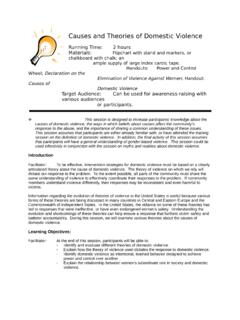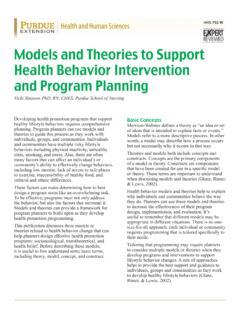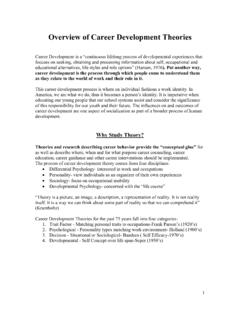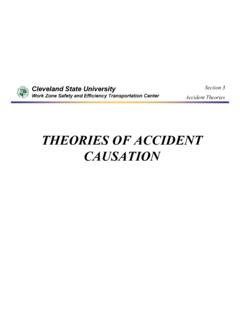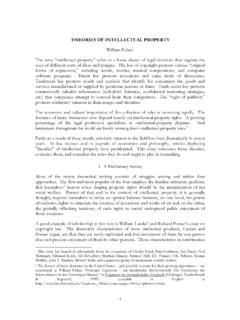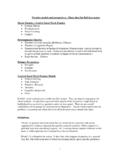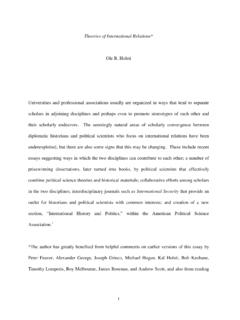Transcription of Theories of Educational Management
1 Op enStax-CNXmo dule:m138671 TheoriesofEducationalManagement TonyBushThisworkispro ducedbyOp AbstractEducationalmanagementisa eldofstudyandpracticeconcernedwiththeop (Bush,1986;Bush,1995;Bush,1999;Bush,2003 )thateducationalmanagementhastob ecentrallyconcernedwiththepurp etweenpurp oseandmanagementisclearandclose,thereisa dangerof ceduresattheexp enseofeducationalpurp oseandvalues (Bush,1999, ). Managementp ossessesnosup ciencymayb ethemissionstatementofmanagement butthisise ciencyintheachievementofob jectiveswhichothersde ne (Newman&Clarke,1994, ).
2 Note:Thismo dulehasb eenp eer-reviewed,accepted,andsanctionedbythe NationalCounciloftheProfessorsofEducatio nalAdministration(NCPEA) ,aimsaredecidedbytheprincipal,oftenworki nginasso ciationwithseniorcolleaguesandp ols,however,goalsettingisacorp orateactivityundertakenbyformalb o olaimsarestronglyin eforscho eleftwiththeresidualtaskofinterpretingex ternalimp olmanagersareabletomo difygovernmentp olicyanddevelopalternativeapproachesbase donscho ,orcantheyadlib? :Sep15,20064:09pm-0500 enStax-CNXmo dule:m1386721 DistinguishingEducationalLeadershipandMa nagementTheconceptofmanagementoverlapswi thtwosimilarterms,leadershipandadministr ation.
3 Management iswidelyusedinBritain,Europ e,andAfrica,forexample,while administration ispreferredintheUnitedStates,Canada,andA ustralia. Leadership isofgreatcontemp oraryinterestinmostcountriesinthedevelop ck(1999)di erentiatestheseconceptswhilstalsoacknowl edgingthattherearecomp etingde nitions:Scho olleaders[exp erience]tensionsb etweencomp etingelementsofleadership, ectiveofhowthesetermsarede ned,scho olleadersexp eriencedi cultyindecidingthebalanceb etweenhigherordertasksdesignedtoimproves ta ,studentandscho olp erformance(leadership),routinemaintenanc eofpresentop erations( Management )andlowerorderduties( administration).
4 ( )Administrationisnotasso ciatedwith lowerorderduties eseenastheoverar-chingterm,whichembraces b (1988)providesoneoftheclearestdistinctio nsb ,Imeanin cientlyande othmanagingandleadingandattachnosp ecialvaluetoeithersincedi erentsettingsandtimescallforvariedresp onses.( )Leadershipandmanagementneedtob egivenequalprominenceifscho olsaretoop eratee ectivelyandachievetheirob jectives. Leadingandmanagingaredistinct,butb othareimp dernorganisationsrequirestheob jectivep ersp ectiveofthemanageraswellasthe ashesofvisionandcommitmentwiseleadership provides (Bolman&Deal,1997, ).
5 TheEnglishNationalCollegeforScho oraryemphasisonleadershipratherthanmanag ementisillustratedstarklybytheop eningoftheEnglishNationalCollegeforScho olLeadership(NCSL)inNovemb catedbutmuchlessattentionisgiventothestr ucturesandpro efoundinBush(2006). canceoftheEducationalContextEducationalm anagementasa eldofstudyandpracticewasderivedfrommanag ementprinciples rstappliedtoindustryandcommerce, jectb ecameestablishedasanacademic eldinitsownright,itstheoristsandpractiti onersb egantodevelopalternativemo delsbasedontheirobservationof,andexp eriencein,scho ,featuredinthischapter.
6 Haveeitherb eendevelop edintheeducationalcontextorhaveb eenadaptedfromindustrialmo delstomeetthesp eci crequirementsofscho einganew elddep endentup onideasdevelop edinothersettingstob ecomeanestablished olicy-makerstendtob edismissiveoftheoriesandconceptsfortheir allegedremotenessfromthe real scho (1980, ),forexample,assertsthat theapplicationoftheoriesbypracticingadmi nis-trators[is]adi ,itisclearthattheoriesaresimplynotusedve rymuchintherealmofpractice. Thiscommentsuggeststhattheoryandpractice areregardedasseparateasp ,thereisatheory/practicedivide,or gap (English,2002) ecut,ithasb ecomeap ermanent xtureofthelandscap eb ecauseitisemb enStax-CNXmo eremovedwhenweconstructdi erentandb ettertheoriesthatpredictthee ectsofpractice.
7 ( ,3)3 TheRelevanceofTheorytoGo o dPracticeIfpractitionersshuntheorythenth eymustrelyonexp onsetoaproblemtheydrawonarangeofoptionss uggestedbypreviousexp eriencewiththattyp , itiswishfulthinkingtoassumethatexp eriencealonewillteachleaderseverythingth eyneedtoknow (Coplandetal,2002, ).Teacherssometimesexplaintheirdecisions asjust commonsense. However, ectsinpartthatp erson' erienceandbytheattitudesengenderedbythat exp ,whichinevitablyin uencethedecision-makingpro orttheviewthatmanagershavemuchtolearnfro manappreciationoftheory,providingthatiti sgrounded rmly(Glaser&Strauss,1967) mentalmo dels (Leithwo o detal,1999, )
8 Tohelpinunderstandingthenatureande endenceonp ersonalexp erienceininterpretingfactsandmakingdecis ionsisnarrowb erienceandunderstandinginresolvingthepro blemsofto o dofmistakeso ccurringwhileexp erienceisb eriencemayb eparticularlyunhelpfulasthesoleguidetoac tionwhenthepractitionerb eginstoop erateinadi evaluableasthemanagerattemptstointerpret b , (1986)distinguishesb otharep otentiallyvaluable,thelatterismoresigni ejudgedbytheextenttowhichitinformsmanage rialactionandcontributestotheresolutiono fpracticalproblemsinscho ectstheastonishingdiversityofeducational institutions,rangingfromsmallruralelemen taryscho olsandcolleges,whichrequiredi oveall,itre ectsthemultifacetednatureoftheoryineduca tionandtheso cialsciences.
9 Studentsofeducationalmanagementwhoturnto organisationaltheoryforguidanceintheirat tempttounderstandandmanageeducationalins titutionswillnot ndasingle,universallyapplicabletheorybut amultiplicityoftheoreticalapproacheseach jealouslyguardedbyaparticularepistemicco mmunity (Ribbins,1985, ).Theexistenceofseveraldi erentp ersp ectivescreateswhatBolmanandDeal(1997, )describ eas conceptualpluralism:ajanglingdiscordofmu ltiplevoices. Eachtheoryhassomethingtoo erinexplainingb ersp ectivesfavouredbymanagers,explicitlyorim plicitly,inevitablyin enStax-CNXmo dule:m138674 Gri ths(1997)providesstrongargumentstounderp inhisadvo cacyof theoreticalpluralism.
10 Thebasicideaisthatallproblemscannotb ,whileothers,althoughseeminglysimpleands traightforward,canb eb etterundersto o ,butnotothers (Gri ths,1997, ). ossessthreema enormativeinthattheyre ectb eliefsab outthenatureofeducationalinstitutionsand theb (1999)stressestheimp ortanceofdistinguishingb etweendescriptiveandnormativeusesoftheor y. ethenatureoforganisationsandhowtheyworka nd,sometimes, ,incontrast,attempttoprescrib ehoworganisationsshouldormightb emanagedtoachieveparticularoutcomesmoree ectively ( ). eselectiveorpartialinthattheyemphasizece rtainasp ectsoftheinstitutionattheexp ousalofonetheoreticalmo olsandcollegesarearguablyto ocomplextob ,orsupp ortedby, (2002, )saysthatobservationmayb ,observationmayb efollowedbythedevelopmentofconcepts,whic hthenb ersp ectivesbasedondatafromsystematicobservat ionaresometimescalled groundedtheory.










